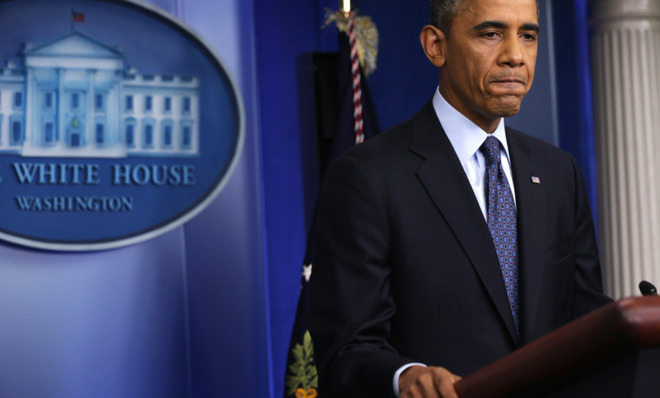Will Obama regret curbing Egypt's military aid?
Punishing the military during such a chaotic time could come back to haunt him

A free daily email with the biggest news stories of the day – and the best features from TheWeek.com
You are now subscribed
Your newsletter sign-up was successful
For many, the Obama administration's decision to suspend some of the U.S.'s $1.5 billion of annual military aid to Egypt is a seriously belated one. The argument is straightforward: U.S. law states that you can't give aid to a country in which a coup has taken place, which is exactly what happened in the summer when the Egyptian military ousted President Mohamed Morsi. To continue supporting the Egyptian military would go against core principles of democracy; indeed, the fact that President Obama took this long to take action has disappointed many.
But the situation in Egypt has never been that simple. As Eric Trager points out at The New Republic, by the time Morsi was pushed out of power, he was a democratic president "in name only." Having surged to victory in the country's first legitimate elections, the former Muslim Brotherhood leader squandered his popularity by becoming increasingly authoritarian, pushing through an Islamist constitution, and dispatching his supporters to beat and torture protesters outside the presidential palace.
The coup took place as millions of Egyptians protested against Morsi's rule in the streets. It's arguable that Egypt's interim leader, Gen. Abdel-Fattah el-Sisi, had no option but to take control in order to restore some sort of stability. The fact that President Obama waited until now to suspend aid shows that he was aware of this tricky dynamic.
The Week
Escape your echo chamber. Get the facts behind the news, plus analysis from multiple perspectives.

Sign up for The Week's Free Newsletters
From our morning news briefing to a weekly Good News Newsletter, get the best of The Week delivered directly to your inbox.
From our morning news briefing to a weekly Good News Newsletter, get the best of The Week delivered directly to your inbox.
However, since then, Sisi has predictably succumbed to the temptation that most coup leaders face, becoming increasingly autocratic, banning all Muslim Brotherhood activities, and carrying out a crackdown in which at least 1,000 people have been killed. But Trager argues that cutting off aid during such an anxious period — and just two days after three brazen terrorist attacks — will cost America substantial influence in both Egypt and the region. Obama should have continued to bide his time, he argues, and pushed for a swifter transition to democracy when the situation had calmed down a bit.
Others disagree. After all, implicitly supporting a military coup that has led to over a thousand deaths — no matter how complex the coup's roots — isn't a great look for Obama. Then there's the possibility that cutting aid could actually help Obama regain control over events.
Look at Mali, says Max Fisher at The Washington Post. The West African country had its aid cut off in 2012. Since then, its leaders have made concrete steps toward democracy, and the U.S. now intends to restore aid to the country at some point in the near future. Why not try the same with Egypt?
So then the big question becomes: How much leverage does American aid even buy Obama? Up until now, says Michael Crowley at TIME, the president has continued to pump money into the Egyptian military in the hope that Sisi "takes Defense Secretary Chuck Hagel's phone calls and listens to his pleas for non-violence and political inclusion." But so far, those pleas have largely gone ignored.
A free daily email with the biggest news stories of the day – and the best features from TheWeek.com
Maybe it's time for Plan B. In that spirit, Secretary of State John Kerry today said that aid deliveries would resume on the basis of Egypt's future "performance" in its transition toward democracy.
Will America's gamble pay off? Some in Egypt think cutting aid will only empower the Egyptian military, emboldening Sisi and making him look like a national hero. Others, like Trager, think it will help resurgent Islamic militants further destabilize the country.
Neither scenario does much good for Obama.
Frances Weaver is a senior editor at The Week magazine. Originally from the U.K., she has written for the Daily Telegraph, The Spectator and Standpoint magazine.
-
 Switzerland could vote to cap its population
Switzerland could vote to cap its populationUnder the Radar Swiss People’s Party proposes referendum on radical anti-immigration measure to limit residents to 10 million
-
 Political cartoons for February 15
Political cartoons for February 15Cartoons Sunday's political cartoons include political ventriloquism, Europe in the middle, and more
-
 The broken water companies failing England and Wales
The broken water companies failing England and WalesExplainer With rising bills, deteriorating river health and a lack of investment, regulators face an uphill battle to stabilise the industry